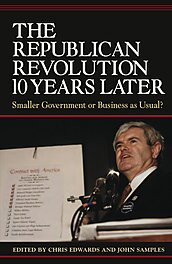The dramatic election of 1994 gave control of Congress to the Republicans for the first time in four decades. In their Contract with America, the Republicans promised “to restore the bonds of trust between the people and their elected representatives” and to end “government that is too big, too intrusive, and too easy with the public’s money.”
Did they succeed? Has the “Republican Revolution” created lasting change in Washington, or has the reform spirit of 1994 fallen victim to special interests and defenders of the status quo? This book answers those questions with a detailed assessment of the successes and failures of Republican policy during the past 10 years.
The collection includes contributions from 16 policy experts, principally Cato Institute scholars, who assess the Republican record in each major policy area, including welfare, education, heath care, regulation, taxation, and trade. It also features essays by the key architects of the 1994 election victory, Newt Gingrich and Dick Armey, who went on to lead the Republican House of Representatives.
As the Republicans begin their second decade in power, this book will help supporters and critics of the party’s agenda understand what lies ahead in federal policymaking.
